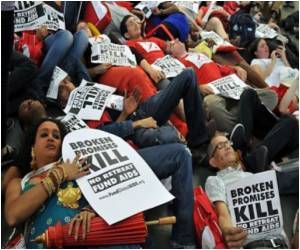
Until now, these countries have been recipients of AIDS funds, not donors.
But, Kazatchkine argued, the time was ripe for them to make at least a first step towards providing financial help.
"I believe that in a globalising world, in a world where countries like China are joining, and want to join, world governance, at a time when the G8 is becoming the G20, it is right for these countries to take up a share of the burden," he told AFP in an interview.
Kazatchkine, executive director of the Global Fund to Fight AIDS, TB and Malaria, said he had already flown to Beijing to press his case.
"The Chinese told me they would think about it," he said. A trip to Delhi is scheduled for next month, he added. Kazatchkine has also been lobbying the petrodollar-flush economies of the Gulf.
Advertisement
He cautioned, though, that he did not expect huge contributions from countries still struggling to rise out of poverty. Such a thing was "very far off."
Advertisement
Kazatchkine urged traditional donors to maintain support and explore innovative financing, such as a micro-tax on foreign exchange transactions, to raise precious cash.
"I think it is not impossible, as far as Europe is concerned, to have a tax on euro transactions. But I am hearing that certain finance ministers want this tax to be used as a buffer for future bank crises, rather than go towards development aid."
New figures have pointed to a worrying slump in funds for the 29-year offensive against AIDS in the wake of the banking crisis.
After a six-year run of double-digit increases, western donors cut back in funding last year to 7.6 billion dollars after 7.7 billion dollars in 2008, according to an analysis by the Kaiser Family Foundation and UNAIDS.
The cutback left a funding gap for low- and middle-income economies of at least seven billion dollars compared to needs of 23.6 billion dollars.
For 2010 -- a year for which the G8 has pledged universal access to AIDS drugs -- 25 billion dollars must be found. So far, there is a shortfall of 11.3 billion, according to a report in the US journal Science.
The Global Fund has currently allocated 964 million dollars for China, of which around 40 percent will target AIDS. For India, the Fund's current allocation is 995 million dollars, two-thirds of which will go to AIDS.
A precedent fro switching to donor status was set in 2006 by Russia. Surfing a rise in income from energy exports, Moscow said it would reimburse 270 million dollars in Global Fund grants for activities in Russia.
More than 33 million people have the human immunodeficiency virus (HIV) that causes AIDS. Around 5.2 million badly-infected poor people have access to the drugs that turn HIV to a manageable, if chronic, disease, but this is between a third and a half of those who need the therapy.
Kazatchkine said without funds, a dark future loomed for those waiting to grasp the lifeline.
"When they arrive at AIDS clinics, they will have to be told, 'Put your name on the waiting list. As soon as we get the drugs, we'll get back to you.' But when that day comes around, they will already be dead."
Source-AFP















